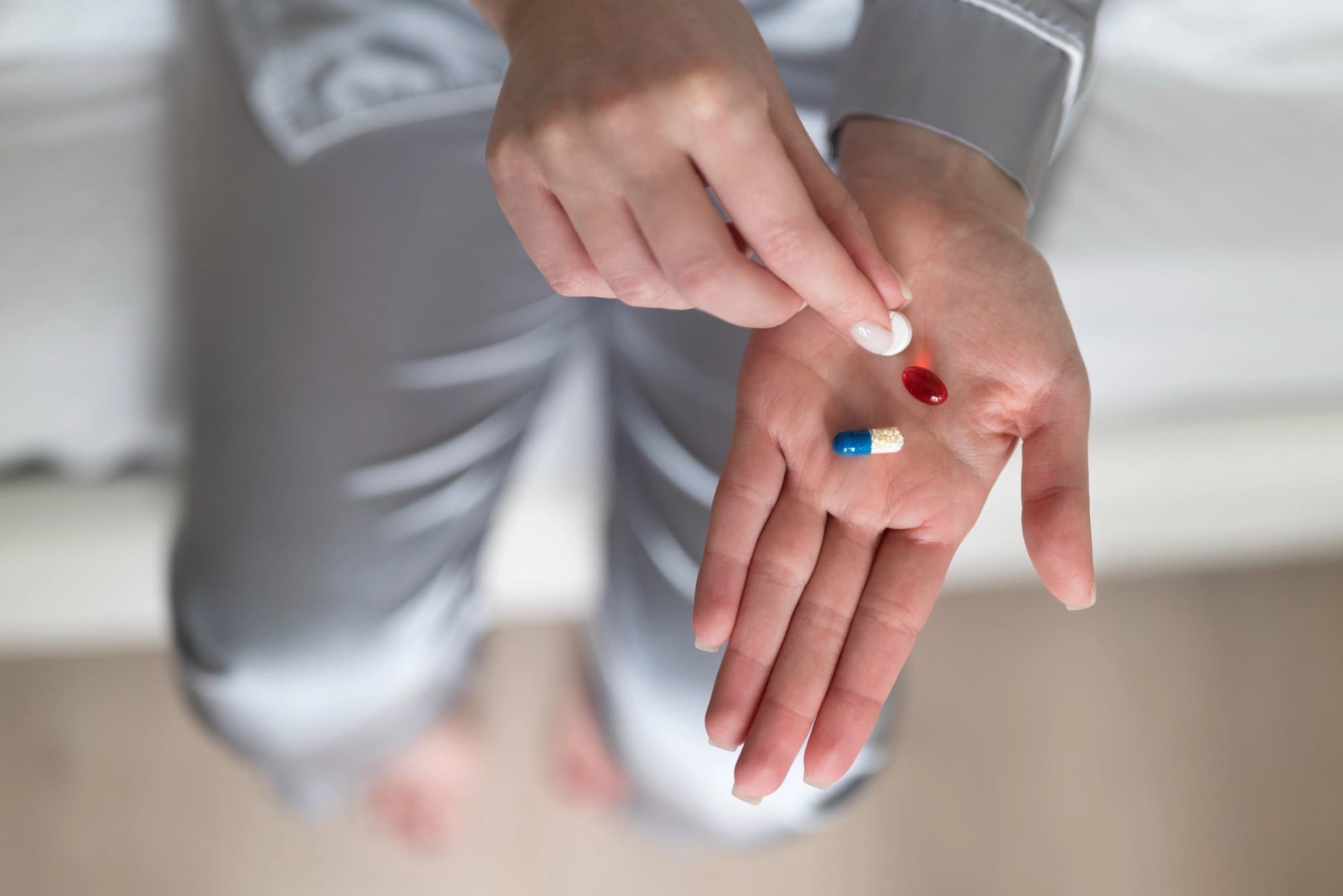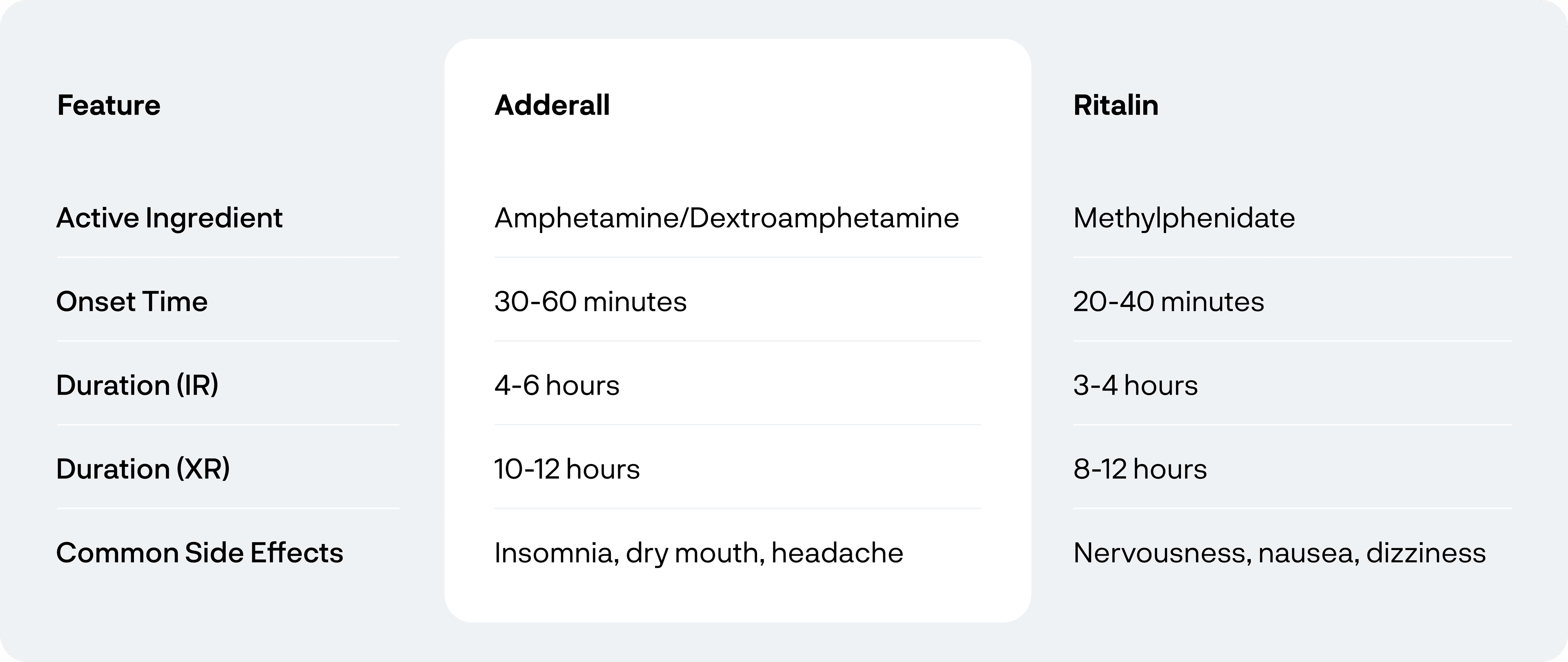Oct 01, 2025
Ritalin vs. Adderall: Which ADHD Medication Is Right for You?

THIS WEBSITE DOES NOT PROVIDE MEDICAL ADVICE. The content included on this website is for informational and educational purposes only. Always consult with your healthcare provider regarding any medical condition and before starting any healthcare or medication regimen.
Introduction
Managing ADHD isn’t just about focus—it’s about finding the right medication that works for your brain and your body. If you've been diagnosed with ADHD, your doctor may recommend a stimulant like Ritalin or Adderall. These medications are commonly prescribed to improve attention, reduce hyperactivity, and support executive functioning. While they’re often used interchangeably, they have different active ingredients and may affect individuals differently.
In this guide, we’ll break down how Ritalin and Adderall work, their side effects, dosage, and which one might be a better fit for you. And if you’ve been prescribed one of these medications, you may be able to save significantly at the pharmacy with aCareCard prescription discount card. No insurance or sign-up required.
Conditions Treated By Stimulant Medications
ADHD and Its Impact on Daily Life
ADHD is a neurodevelopmental disorder that affects both children and adults. It can make it harder to concentrate, sit still, or manage time effectively. For many people, ADHD can disrupt school, work, relationships, and daily responsibilities.
Why Medication Is Sometimes Necessary
While behavioral therapies and routines can be helpful, medication may also be recommended to reduce symptoms. Stimulant medications like Ritalin and Adderall are often part of a larger treatment plan that also includes lifestyle adjustments and support.
Ritalin
What is Ritalin?
Ritalin is a stimulant medication that contains methylphenidate. It works by increasing dopamine and norepinephrine levels in the brain—two chemicals that help regulate attention, behavior, and impulse control.
Effectiveness of Ritalin
Ritalin has been shown to be effective in managing core symptoms of ADHD, particularly in children and adolescents. Research suggests that methylphenidate can significantly improve attention and reduce impulsivity when taken as prescribed.
Forms and Dosage Options
Ritalin is available in several forms, including:
Immediate-release tablets (typically lasting 3 to 4 hours)
Extended-release capsules (lasting up to 8 hours)
Doses are individualized based on factors like age, weight, and response to treatment.
Common Side Effects of Ritalin
Some people may experience side effects, such as:
Trouble sleeping
Decreased appetite
Nervousness or anxiety
Headache
Stomach discomfort
More serious risks include elevated blood pressure, mood changes, and potential misuse if taken outside of prescribed guidance.
Drug Interactions and Precautions
Ritalin may interact with:
Monoamine oxidase inhibitors (MAOIs)
Medications for seizures or high blood pressure
Other stimulant medications
Your provider may adjust your dose or monitor certain health conditions while you are on this medication.
Adderall
What is Adderall? Adderall is another stimulant medication, but it contains mixed amphetamine salts, which work similarly by enhancing dopamine and norepinephrine activity. It’s used to treat ADHD and narcolepsy and is available in both immediate- and extended-release forms.
Effectiveness of Adderall Adderall has been widely studied and is considered effective for treating ADHD across age groups. Studies show improvements in attention span, task completion, and hyperactivity in both children and adults.
Forms and Dosage Options
Adderall is available in:
Immediate-release tablets (lasting 4 to 6 hours)
Extended-release capsules (lasting up to 12 hours)
Your provider will recommend a dosage that fits your individual needs and treatment goals.
Common Side Effects of Adderall
Common side effects may include:
Dry mouth
Trouble sleeping
Weight loss
Increased heart rate
Anxiety or irritability
Some individuals may also notice mood swings or restlessness. As with all stimulants, Adderall has a risk of misuse and should be taken only as directed.
Drug Interactions and Precautions
Adderall may interact with:
MAO inhibitors
Acidifying agents that affect drug absorption
Antidepressants or other medications affecting heart rhythm
Always inform your provider of any other medications or supplements you are taking.
Ritalin vs. Adderall Comparison Chart

Ritalin vs. Adderall: Key Differences
Speed of Onset and Duration
Ritalin tends to act more quickly, with effects starting in about 20 to 60 minutes.
Adderall usually begins working within 30 to 60 minutes but often lasts longer, especially in extended-release form.
Side Effect Profile Comparison
While both medications share similar side effects, they may affect individuals differently:
Ritalin may be more likely to cause headaches or nervousness
Adderall may be more associated with anxiety or dry mouth
The best way to understand how your body will respond is through supervised trial and adjustment under a health care provider's care.
Availability and Cost Considerations
Both medications are available in generic forms—methylphenidate for Ritalin and mixed amphetamine salts for Adderall. Prices can vary based on the pharmacy, region, and insurance coverage. Using a CareCard prescription discount card can help you access lower prices without insurance.
How to Decide Between Ritalin and Adderall
Factors to Consider With Your Health Care Provider
Your provider may consider several factors, including:
How quickly you need the medication to take effect
Duration of symptom coverage required
Co-existing conditions like anxiety or sleep issues
Past medication history
Individual Response and Tolerance
Some people respond better to one medication than the other. It’s not uncommon for a provider to try both, adjusting dosage or form based on how well the medication works and whether side effects occur.
Conclusion
Ritalin and Adderall are both effective treatments for ADHD and narcolepsy. They share similarities but differ in how they work and how long they last. The right choice depends on how your body responds, your lifestyle, and your doctor’s recommendation. As with any medication, follow your provider’s instructions and stay informed about side effects and potential interactions.
You may also be able to save significantly on your prescription by using a Carecard discount card—available for both Ritalin and Adderall, as well as their generic versions.
Frequently Asked Questions
1. Is Ritalin or Adderall better for adults with ADHD? Neither is universally better. It depends on how your body responds, your lifestyle, and any co-existing conditions. Speak with your health care provider to determine the right choice.
2. Can children take Ritalin or Adderall safely? Yes, both medications are approved for use in children with ADHD. Pediatric dosing is carefully monitored and adjusted based on age and weight.
3. Are there non-stimulant alternatives to Ritalin and Adderall? Yes, medications like atomoxetine and certain antidepressants may be prescribed if stimulants are not a good fit. Behavioral therapy is also an important part of treatment.
4. Can I switch from Ritalin to Adderall or vice versa? Switching should only be done under medical supervision. Your provider may recommend a trial period to see how each medication affects you.
5. Where can I find lower prices on ADHD medications? You can compare prices and save on prescriptions using theCareCard prescription discount card, accepted at over 80,000 pharmacies across the country.
